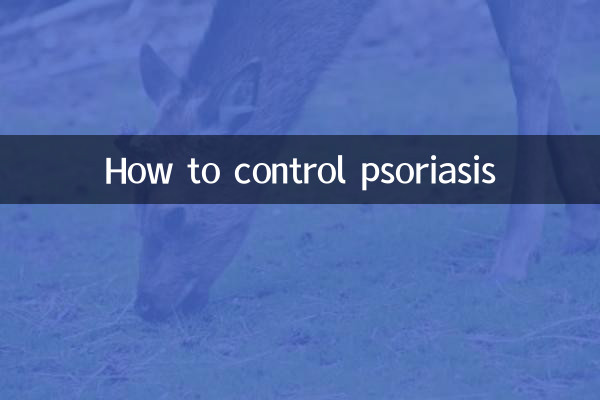How to Control Psoriasis: A Comprehensive Guide to Management and Treatment
Psoriasis (psoriasis) is a common, chronic inflammatory skin disease characterized by red, scaly, and itchy skin. Although there is currently no cure, symptoms can be effectively controlled through scientific management and treatment. This article will combine the hot topics and hot content on the Internet in the past 10 days to provide you with a structured guide to controlling psoriasis.
1. Common symptoms and causes of psoriasis

Symptoms of psoriasis vary from person to person, but common manifestations include:
| Symptom type | Description |
|---|---|
| plaque psoriasis | Red patches of skin covered with silvery scales |
| Gutate psoriasis | Small red spots, often on the trunk and limbs |
| Pustular psoriasis | Pustules appear on the skin, which may be accompanied by fever |
| Erythrodermic psoriasis | Redness of the skin all over the body, accompanied by severe itching |
Common triggers include: stress, skin damage, infection, certain medications, and climate change.
2. Treatment of psoriasis
Based on recent hot topics discussed across the Internet, we have compiled the following treatment options:
| treatment type | Specific methods | Effect evaluation |
|---|---|---|
| topical treatment | Corticosteroid creams, vitamin D3 derivatives | Mildly to moderately effective |
| Phototherapy | Narrow-band UVB, PUVA therapy | Effective for moderate to severe |
| Systemic treatment | Methotrexate, cyclosporine A | Severely effective |
| biologics | TNF-α inhibitor, IL-17 inhibitor | Efficient but expensive |
3. Lifestyle Management and Natural Therapy
Natural treatments for psoriasis that have been hotly discussed on the Internet recently include:
| method | Implementation recommendations | Things to note |
|---|---|---|
| diet modification | Increase omega-3 fatty acids and reduce alcohol and red meat | Avoid extreme diets |
| stress management | Meditation, yoga, deep breathing exercises | Regular practice is more effective |
| skin care | Use a mild moisturizer and avoid harsh products | The bath water temperature should not be too high |
| complementary therapies | Fish oil, curcumin supplements | Need to consult a doctor |
4. Latest research progress and future prospects
According to scientific research reports in the past 10 days, the following breakthroughs have been made in the field of psoriasis treatment:
| Research direction | Latest findings | Potential applications |
|---|---|---|
| gene therapy | Multiple genetic loci associated with psoriasis discovered | Targeted drugs may be developed in the future |
| Microbiome Research | The correlation between gut flora and psoriasis | Probiotic auxiliary treatment |
| new biologics | IL-23 inhibitors show good results | May become first-line treatment |
5. Answers to Frequently Asked Questions by Patients
The most frequently discussed patient questions recently include:
1.Is psoriasis contagious?- No, psoriasis is a non-communicable disease.
2.Can psoriasis be cured?- There is currently no cure, but it can be effectively controlled.
3.How long does it take for treatment to take effect?- Depending on the treatment method, it usually takes 4-12 weeks.
4.Does psoriasis affect lifespan?- Generally not, but may increase the risk of cardiovascular disease.
6. Professional suggestions and summary
Controlling psoriasis requires a multi-pronged approach:
1. Follow the treatment plan prescribed by the doctor and have regular follow-up visits
2. Maintain a healthy lifestyle and avoid known triggers
3. Join patient support groups to share experiences and advice
4. Pay attention to the latest treatment progress and discuss suitable options with your doctor
Remember, although psoriasis is stubborn, with scientific management and active treatment, most patients can achieve good control and maintain a high quality of life.

check the details

check the details